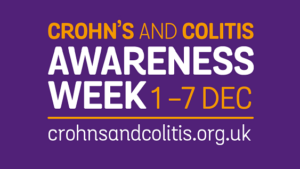My IBD Story – Crohn’s and Colitis Awareness Week

This week is Crohn’s and Colitis Awareness week. Crohn’s Disease and Ulcerative Colitis are forms of inflammatory bowel disease, a chronic, incurable autoimmune disease that mainly attacks your bowel.
Around 300,000 people in the UK live with the devastating consequences of Crohn’s Disease or Ulcerative Colitis* on a daily basis. The symptoms include severe abdominal pain, rectal pain, diarrhoea (including bloody stools), constipation, nausea, weight loss, fatigue, mouth and throat ulcers and joint pain. It’s a debilitating illness, which can leave people housebound during a flare.
The treatments to manage the conditions can also take a toll and include infusions with biologics and numerous surgeries.
To raise awareness of these crippling diseases, two members of the Bladder and Bowel Community have agreed to tell their story.
Olivia Hurst
“I became ill whilst on holiday in Bali in April 2016. I had to have an emergency appendectomy and I got diagnosed with a parasite. After returning home from Bali, my stomach symptoms didn’t improve and I had a colonoscopy, which diagnosed me with Crohn’s Disease.
Crohn’s Disease can affect my daily life. I currently work full time as a student veterinary nurse but when my illness flares, I struggle to work and study due to extreme fatigue, diarrhoea, abdominal and joint pain. The hardest part of having Crohn’s Disease is feeling like it has taken a huge chunk of my life when I’m only 22 years old. Missing important events and work due to illness is always upsetting and the uncertainty that I never know if I’m going to be well again is always on my mind.
I’ve had to take lots of different medications including azathioprine and steroids, plus injectable biologics including humira and stelara. Three weeks ago, I had to have surgery to remove a stricture from my small bowel which caused an intestinal blockage. I also had abscesses around my distal ileum, which had penetrated all the way through my intestinal wall.
I manage to stay positive by thinking there’s always people going through worse situations. I am lucky to still be able to work and do what I can when I feel well. My family and friends are all really kind and understanding. I’m lucky to have such a supportive network around me. Also scientific work is so far advanced that I’m sure they will find a cure one day!
I think awareness has improved since when my nan was diagnosed with Crohn’s Disease 10 years ago but more could still be done. Another difficult part is having to explain yourself to people that think you don’t look sick, who question your absence and mistake it for IBS, when actually it’s far more serious. I think breaking the stigma on these invisible illnesses is really important.
My future includes attending Vet School in 2019 to train as a veterinary surgeon to further my career after I qualify as a veterinary nurse.”
Ann Ramsell
“Around 10 years ago, I was diagnosed with IBS (irritable bowel syndrome) after suffering stomach cramps and bloating for years.
In October 2016, I had a particularly bad bout but I thought it would pass. I went to work the Friday night and I was delirious through the night, it turned out I had a perforated bowel and was a day away from death. My stomach was full of faeces and it was poisoning me. I had a bowel resection and a month later I was diagnosed with Crohn’s Disease.
I was off work for three months. When I went back my colleagues and manager were absolutely brilliant. I had a lot of pain over the next few months and then whilst I waiting to go on humira, I developed an enterocutaneous fistula on my belly which was misdiagnosed many times until a new doctor sent me to hospital there and then.
It was decided by the IBD nurse that I should start humira to heal the fistula. It worked and the humira has done me the power of good. Last year the fistula opened up and I got a pseudomonas infection in it but that cleared with antibiotics. I still have permanent diarrhoea and sometimes other problems like joint pain. The IBD nurse thinks that I have had a loss of response to the humira but I think it might be BAM (Bile Acid Malabsorption). I’m waiting for test results to come back to find out what is causing my diarrhoea.
On the whole, life is very good, this has taught me to be thankful for everyday but I am very aware this could change in a second. There are a lot of things I can’t eat which can be a pain but hey ho I’m still here.”
To find out more about Crohn’s Disease and Ulcerative Colitis, visit Crohn’s and Colitis UK
If you have a bladder or bowel condition and you would like to share your story with the community you can contact us by email [email protected], via Facebook or Twitter.
*Stats from Crohn’s and Colitis UK
